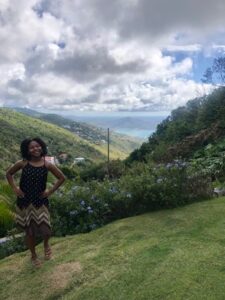Eurnett Christopher ’25, Environmental Science
 From the second grade, Eurnett knew that she wanted to become a marine biologist. As an islander, Eurnett was keenly aware of the importance of marine conservation. She recalls a time where the United States Virgin Islands used to be a vibrant and luscious place. As a child, she looked forward to exploring tidepools and reefs on Coki Point Beach. After some time, the reefs she once loved exploring became gray and void of life but her bond with the ocean remained strong.
From the second grade, Eurnett knew that she wanted to become a marine biologist. As an islander, Eurnett was keenly aware of the importance of marine conservation. She recalls a time where the United States Virgin Islands used to be a vibrant and luscious place. As a child, she looked forward to exploring tidepools and reefs on Coki Point Beach. After some time, the reefs she once loved exploring became gray and void of life but her bond with the ocean remained strong.
In her AP Biology course, Eurnett learned about Stony Coral Tissue Loss Disease (SCTLD). In addition to its lethality, its origin is unknown making it difficult for scientists to create a solution. Even after the course, she felt compelled to remain involved in the progress of SCTLD in the Virgin Islands and other affected islands. This issue strengthened her dream to pursue education in marine science, in particular coral restoration, and give back to the Virgin Islands. These dreams led her to pursue an environmental science degree at Lafayette College.
While at Lafayette, she was exposed to new skill sets and accessories that would accommodate her with my future career. During her first-year, she took “Introduction to Economics” and “Mapping Environmental Justice”. Both courses taught her the importance of data analysis and decision-making that influence the policy issues that govern our oceans.
Eurnett loved the idea of displaying environmental issues to a wide range of viewers through geographic information system (GIS) programs, like R. Her goal is to strengthen the advocacy for change in the US Virgin Islands that includes people of all backgrounds. Eurnett was able to expand these skills through an internship at Mote Marine Laboratory in the Coral Health and Disease Lab. There, she investigated the physiological effects of Stony Coral Tissue Loss Disease (SCTLD) contaminated sediment on Montastraea cavernosa.
Recent studies showed that sediment can act as a vector for Stony Coral Tissue Loss Disease. The internship helped determine that sediment is not a long term (2-month) reservoir for Stony Coral Tissue Loss Disease. Eurnett wishes to learn more about the sediment transmissibility and create models for areas of high sedimentation to make better predictions of its prevalence and transmission patterns.
Eurnett plans to pursue a degree in Environmental Science, with a minor in Data Science. With this knowledge, she wishes to obtain a job that relates to coral restoration and policy-making/ economic assessment for the betterment of the ocean and the people of the Virgin Islands. In spring 2023, she is joining Dr. Rothenberger’s Lab. Outside of academics, she is a member of the Lafayette Crew team and a Chemistry Supplemental Instruction Leader (SI).